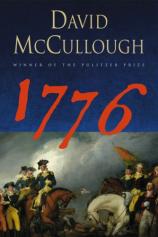1776
Review
1776
1776, by David McCullough, represents a sea change in the work of one of America's truly extraordinary historians. The two-time Pulitzer Prize winner and twice National Book Award recipient has traditionally chronicled epic times and critical historical events on a grand scale. McCullough told of the lives of three great American Presidents: John Adams, Theodore Roosevelt and Harry Truman. He recounted the massive manpower efforts and political will required to construct the Brooklyn Bridge and the Panama Canal. The grand epoch of life was the field that McCullough endeavored to cultivate. A McCullough historical tome was a massive historical effort whose length often went unnoticed because the quality of writing made the pages turn with ease and rapidity.
While dealing with a subject of no less historical significance than his previous works, 1776 is a far more focused and limited historical study. As the title indicates, this book covers one year, albeit a critical year, in the conflict between the world's greatest power, Great Britain, and the freedom-seeking colonies that would ultimately succeed England as the lodestar of democracy in the world. Every American knows what occurred on July 4, 1776, the midpoint of McCullough's magnificent chronology. 1776, in an on-the-scene, news reporting style, chronicles the events leading up to the signing of the Declaration of Independence and the events immediately following the Philadelphia signing in vivid, mesmerizing detail. McCullough has the ability to bring history to life. In an era when people learn their history from sources other than books, our nation owes a writer such as McCullough a debt of gratitude.
The year-long narrative actually begins in October of 1775, on the streets of London during the pageantry and splendor of the opening of Parliament. George III, King of England, is scheduled to address that body on the thorny issue of war in America. The debate that would occur on that fall day in the House of Commons carries with it an eerie similarity to speeches and debates that have occurred in other chambers, at other important times in history. Even today, similar speeches and similar arguments surrounding events in Iraq can be heard in the House of Commons. The King made clear his commitment to defeat the rebellion. He would commit the necessary soldiers, navy and even foreign mercenaries to the effort. "Among the many unavoidable ill consequences of this rebellion," he concluded, "none affects me more sensibly than the extraordinary burden which it must create to my faithful servants."
Others did not agree. John Wilkes, Lord Mayor of London, rose to speak in opposition. The battle with the colonies was "unjust…fatal and ruinous to our country," he declared. "Should we not succeed… we shall be considered as the most implacable enemies, an eternal separation will follow, and the grandeur of the British Empire pass away." On behalf of the King and the government Lord North concluded the debate. The policy in place, he argued, "will show we are in earnest, that we are prepared to punish, but are nevertheless ready to forgive. This is in my opinion, the most likely means of producing an honorable reconciliation."
How did the most powerful nation in the world find itself defeated by a Continental Army that was undermanned, poorly led and woefully equipped? What transpired during the year in question explains how the foundation was laid for a victory that turned the world upside down. As in any war, Lady Luck cast her lot with the victors. A Dunkirk-like retreat from Brooklyn was accomplished due to heavy fog and 9,000 troops survived to fight again. In the early days of the war, British military leaders were overconfident and, as a result, not aggressive in their tactics. That strategy would haunt the British as the conflict wore on.
1776 is not an historical narrative that bogs itself down in minutiae or incredible detail. There are no lengthy discussions of troop maneuvers or combat casualties. Instead, the reader is introduced to real people who may not be the best-known heroes of the revolution but are important participants in the war effort. Charles Lee was Washington's second-in-command hampered by somewhat of a temper. The Indians named him "Boiling Water." General Israel Putnam was a hero of the Battle of Bunker Hill. At 57, he was one of the oldest members of the army. "Old Put," as he was known to his men, was also one of the bravest. He feared nothing. Israel Trask, at age 10, was perhaps the youngest soldier. He served as a messenger and cook's helper. As a superb biographer McCullough paints brief but nevertheless lasting portraits of soldiers and officers fighting for both the Americans and the British. It is a sobering reminder that ultimately it is the troops that pay the price for warfare. Even today in America the morning news reminds us of that poignant lesson.
The American Revolution has never had the glamour or romance of the Civil War or World War II. 1776 will not change that fact. But the beauty of McCullough's work is that it will inspire readers to look deeper into the story of America's birth. Even today, as our nation struggles to confront issues involving freedom, democracy, security and the balance between those issues, it is important to remember how and why America was born. Thomas Paine remarked about the year recounted by McCullough, "These are the times that try men's souls." It is important to remember those times, and the spirit and struggle that sent our country on its path to greatness.
Reviewed by Stuart Shiffman on December 22, 2010
1776
- Publication Date: May 24, 2005
- Genres: History, Nonfiction
- Hardcover: 400 pages
- Publisher: Simon & Schuster
- ISBN-10: 0743226712
- ISBN-13: 9780743226714





